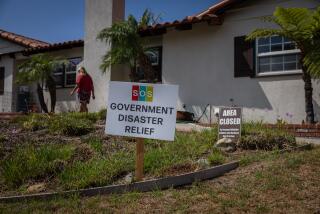Valley Commentary : There’s No Age Limit to Disaster Preparedness : Seniors should hook up with multipurpose centers, which offer counseling, medical care, emotional support and more during disasters.
- Share via
Jan. 17’s earthquake devastated much of the San Fernando Valley, taking a heavy physical and emotional toll. The elderly were especially hard hit and must take action now to prepare for the future.
The elderly and the earthquake
A large percentage of senior citizens are widowed and live alone. The earthquake frightened them, making many of them feel alone, vulnerable and depressed.
Many could not move furniture, which had moved or fallen across exits. They found it difficult to clean up. They felt inadequate.
Many had not stocked up on water and quick-fix meals. Some did not eat for several days and fainted while waiting in line for disaster assistance. Some became confused because of hunger and thirst.
Vital medications were ruined or lost. The consequences ranged from feeling weak to medical crises.
Senior citizens with mental impairments had difficulty understanding what was happening and became anxious or agitated. Spouses and children were often frustrated with the burden of their own fears and responsibilities. Many seniors who didn’t know their neighbors and weren’t affiliated with a senior center were “invisible.” Some needed help and no one knew it.
What is available to help the elderly?
Multipurpose senior centers, largely funded by the city’s Department of Aging, are there to help.
For the healthy, mobile senior they offer counseling and rap groups. The elderly can get help in dealing with depression, feelings of inadequacy, anxiety and fear caused by the earthquake.
Staff members answer questions and direct seniors to the places where they can receive assistance. Help is available with filling out disaster-aid forms. Tax preparation and legal consultation are also offered.
Screenings for blood pressure, breast and prostate cancer, diabetes, glaucoma and cholesterol are available. Organization for the Needs of the Elderly has a Health Fair Expo scheduled for next month.
Hot, nutritious lunches are served at the centers and satellite sites throughout the Valley on weekdays. It is important that seniors not withdraw and become isolated. The centers offer a meeting place where they can gather, socialize and take classes.
For the frail homebound elderly, the centers offer case-management services. A case manager visits the senior in his home, assesses the person’s needs and tries to fill them, directly or through referral.
Available services include hot lunches (drivers can often spot changes in people’s conditions), household chores, help with bathing and grocery shopping.
Volunteers make weekly visits to the homebound, often one of the few human contacts all week.
Seniors who live alone can request a daily reassurance call from the Careline.
For the senior who is a victim of dementia, Parkinson’s, Alzheimer’s, stroke or depression, there are adult day-care centers such as the ONE-sponsored Mark Taper Intergenerational Center. They help to eliminate premature institutionalization and provide respite for the care giver.
When the impaired senior can no longer remain at home, these centers refer people to retirement homes, board and care centers and nursing homes.
Preparing for the future
Seniors should affiliate with a senior center--become visible.
They should get to know their neighbors, who will provide valuable assistance in an emergency.
Emergency response systems can be provided for homebound seniors through the center’s case management services. One system provides a necklace with a button that activates a device attached to the telephone, calling two predetermined people to alert them to an emergency.
The Valley Senior Service & Resource Center in Reseda provides a “vial of life” to each of its members. The senior fills out a form with emergency and medical information, places it in a plastic vial in the refrigerator and attaches a sticker to the outside of the refrigerator telling paramedics it is inside.
Seniors should keep a three-day supply of medications in their purse or pocket. And they should store a three-day supply of water, preferably in small, easy-to-lift containers.
Like everyone, seniors should clear their homes of clutter. Store food that doesn’t require refrigeration, heating or preparation. Don’t forget a can opener. Have first-aid supplies, plastic bags for lining the toilet; keep a flashlight, battery-powered radio and shoes next to the bed. Keep important papers together. Have childproof latches installed on kitchen cabinets and heavy furniture bolted to the wall.
More to Read
Sign up for Essential California
The most important California stories and recommendations in your inbox every morning.
You may occasionally receive promotional content from the Los Angeles Times.













